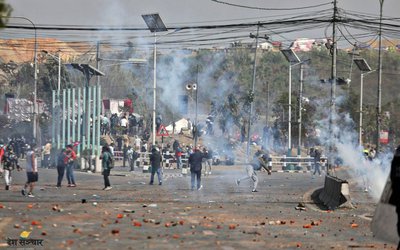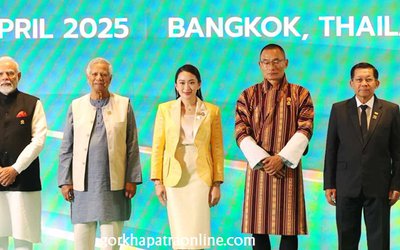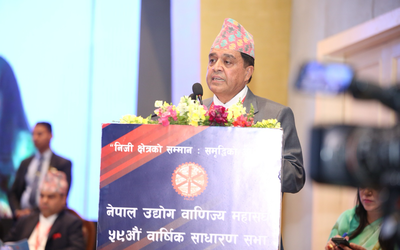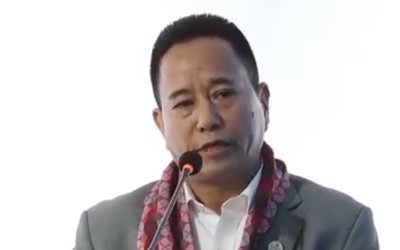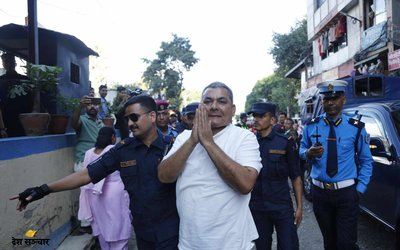
Secretary to the Ministry of Animal Development Dr. KRISHNA CHANDRA PAUDEL, who took part in the COP 21, Paris, as a secretary of Ministry of Science, Technology and Environment, spoke to NEW SPOTLIGHT on issues related to Nepal’s participation and achievement in the COP 21. Just a day before his transfer, Secretary Dr. Paudel spoke to NEW SPOTLIGHT on various issues. Excerpts:
How do you view the Paris Agreement?
The Paris Agreement was signed on the late night of 12 December. It is a major milestone in the UNFCCC process. This is a historic decision the world leaders have made on climate change.
Nepal understands Paris Agreement as a compromise agreement between the rich and poor, the small and the big, developed and developing countries around the world. Some 195 countries came together and they have decided not to allow the temperature to go more than 2 degrees Celsius. Actually it is well below 2 degrees Celsius, leading towards 1.5 degrees Celsius or pre industrial period, which is in fact an ambitious goal. Nepal and other small mountainous countries have been talking about 1.5 degrees, including all the LDCs. However, this was the compromise. This is the best compromise leading to 1.5 degrees Celsius and we welcome it.
Are there any obligations for Nepal?
There are several obligations -- it has added the task on our shoulders to implement the Paris Agreement. First and foremost, we are aware of our stakeholders in Nepal. The Paris Agreement tells about these things. We have to sign it by April 2016 and this should be open for United Nations Headquarter in April 2016. After signing that Nepal will have to ratify this agreement and the ratification process will take some time. Before then, we will be translating this into Nepali language for the sake of easy understanding of our common people, and also our legislators.
How optimistic are you?
I am optimistic that the government of Nepal will welcome this and ratify this. Countries like ours need much stronger agreement and we need to watch on how developed countries will be moving towards achieving this goal. Otherwise, smaller mountainous developing countries, LDCs and small Island developing countries are among the most vulnerable because of this climate change.
What about the financial provisions?
Paris agreement has also some provisions for financial resources to the developing countries. The beauty of the Paris agreement is that this has made the high emitter to be more responsible in a way they are not able to exceed the temperature goal. It has also left some rooms for the developing world that we can develop on our own style. However, the rich and poor countries around the world, developed or developing, allow us to agree on this temperature goal now and periodically, every five years, they will review how we will move on. The second beauty of Paris Agreement is that there will be a financial mechanism for post 2020 which will be honestly contributed by the developed countries, we are optimistic on that.
How was it possible?
The world was watching us when we gathered at Paris for sustaining the next generation and for safer planet. This agreement is historic in a way that the Copenhagen had failed to be a few years ago. It was a big challenge to the government of France to successfully complete the conference. Despite such a huge setback following horrific terrorist attacks just a few weeks before the COP, France was capable to hold the conference peacefully. We recognized that the French presidency is most transparent in conducting its procedures throughout the process of this COP 21.
What are there for smaller countries like Nepal?
Mountainous developing countries like Nepal and Small Island Developing Countries have been raising voices for stronger emission control mechanisms, that was not possible at this stage. The voice of mountain countries was raised frequently by us and whenever Nepal raised the flag that was the signal for mountains and that was quite significant. Under the leadership of the Minister of Science Technology and Environment, we were a relatively smaller team doing that job.
How effectively did Nepal raise the voice of mountainous countries?
Nepal raised the voice for mountainous countries like Bhutan and Afghanistan, Kirgizstan and Uzbekistan. Nepal raised a common voice. For the first time in the COP, Nepal introduced the agenda of small mountainous developing countries since Lima. This year, we were able to introduce the terminology, small mountainous developing countries, since the last meeting in Bonn. However, that was taken to the annex at the final round of negotiation. We put forward a case in writing and our concern to the presidency on behalf of Nepal, Bhutan and Afghanistan. Our demand is that the small mountainous developing countries must be recognized in the agreement. At the end of the day and final round of negotiations, I put forward the case that Nepal has been raising the voice from small mountainous developing countries. Although it was not reflected in the writing of this agreement, we have submitted our concern to the presidency and said that should be reflected in the agreement. While implementing the agreement, the global community will listen to our voice. We stand ready to work with all the participating parties and we want to reassure our firm commitments in the areas of climate change.
How do you get the funding for the programs?
As an LDC, we have some flexibility in funding. Adaptation and mitigation have been fifty-fifty. On adaptation, African countries and LDCs have another separation there, that way our allocating would be secure. But it is more important to be ourselves to champions and get this fund on time and it is much more important for us to build the capacity on implementation for this funding -- whatever Nepal draws. For that reason, Nepal would have to prepare its action plan. Now Nepal is working to prepare the action plan on how to implement this Paris agreement. This plan would be on each of the decision and each of the clauses of Paris Agreement. There will be several activities for next three months. There is the need to engage in a rigorous exercise in the next three months involving various stakeholders. There is the need to interact with donor communities and line ministries to prepare the action plan.
How do you view the existing institutions?
The existing institutions are not sufficient for starting new and additional activities with the given resources. Nepal already has made the climate change budget code with our own sources. That would be vigorously utilized. We are lucky in a way that in Paris Conference 240 million dollars equivalent fund has been raised and pledged by mostly European countries for the LDC Fund. By this LDC Fund, our two of the pipeline projects will be funded. For that Nepalese officials also met with GEF secretariat high level officials in Paris. We also requested that the money is deposited in the account soon. We have requested to release an amount equivalent to 14 million US dollars. One project would be Eco-system based adaptation in the valley and another would be eco-system based adoption and conservation and watershed management that should be implemented by Watershed and Soil Conservation Department.
What would be our responsibility for future COP?
In future COPs our responsibility would be increasing. We are proud to announce that Nepal has been doing a lot of work on mitigation although we are not supposed to carry out mitigation work as Nepal was not among emitter countries. Nepal's share in the global emission is less than 0.25 or less than one percent in totality. We have been encouraging solar lights not only in the rural areas but also in urban centers. Nepal government will encourage every household in the city and town like Kathmandu to install solar appliances for heating and cooking purposes with heavy subsidy. We subsidize 75 percent of the interest in the loan for household and 50 percent subsidy for industrial and entrepreneurial level of the solar applications. We are also encouraging the bio-gas and the prime minister has recently announced that 200 MW equivalent solar power will be generated in the coming two years. These are big commitments from non-emitting countries like Nepal.
What steps has Nepal been taking for mitigation?
Nepal is also encouraging energy efficiency programs, including the installation of micro-hydro program. These mitigation measures demonstrate Nepal is willing to reduce the level of emissions and the question now is what about the giant litigators? They will have more obligations.
What is the basis for adaptation?
Our adaptation measures are based on traditional knowledge and our community of farmers is utilizing the wisdom for improving the situation. They include community based irrigation system, community forestry, community based watershed management system, and conservation and neutralization of the local genetic resources of agriculture, including cereal and horticultures.
How do you look at the success of NCCSP?
NCCSP was much highlighted in the last COP. It stood within five projects among 170 projects. They were among globally launched best projects for community based adaptation. This is a matter of pride for us as Nepal’s adaptation projects were recognized at the global level for the first time. We must showcase this and we must upscale this. We must generate more funds for its promotion.
What is Nepal doing for INDC?
Nepal will soon submit its Intended Nationally Determined Contribution (INDC). It would be adaptation in focus and mitigation measures. It is not a time bound necessity for LDCs but most of the LDCs have submitted that report. Nepal is also drafting it. Nepal needs to have a wider level consultation to submit the report. We need additional funding and additional human resources, we need to strengthen the institution and we need more decentralized institutions from Kathmandu. There is no way, nobody can escape from climate change and this is the problem for everybody. We must all try to reduce the green gas house emission. Countries like Nepal deserve more funding.
- BIMSTEC SUMMIT: Nepal’s Stand
- Apr 11, 2025
- IME GROUP: Expands Into Paper Industry
- Mar 24, 2025
- CPN UML: Instigated By India
- Mar 23, 2025
- ADB’S CHIEF ECONOMIST: Nepal Reduces Poverty
- Mar 11, 2025
- FM DR. DEUBA: A Successful Visit
- Mar 11, 2025






